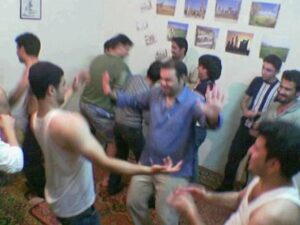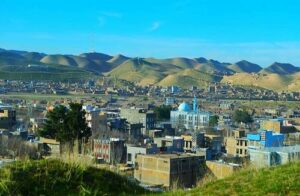
GHOR (SW) – The grim security problems prompted Obaidullah Karimi to leave his homeland for Germany in quest for a bright future. His initial thoughts became more decisive when an array of smugglers lured him in to the journey.
He gathered the limited resources at his disposal and embarked upon the journey to Nimroz province bordering Iran. Moving from Nimroz to Iran was the beginning of the difficult journey. The hardships of the early days of travel showed to Obaidullah a glimpse of the long and dangerous journey, and the realization that the promises made by smugglers would just remain as empty promises.
The smuggler, who had promised Obaidullah a safe crossing to the Iranian border, handed him over to another smuggler in Nimroz, a large man who was stranger to all travelers.
"We reached Tehran after going through thousands of miseries," says Obaidullah. "The smugglers on the route were carrying 15 to 20 people in small cars and other passengers in larger vehicles in groups of up to 50'', he said.
According to Obaidullah, they moved from Iran to Turkey, but along this long route, several of their companions lost their lives due to travel difficulties.
Obidullah says two families were with him when they left for Turkey. Obaidullah and his friends were comfortable with the hope that the two families were with them hence they might not face hardships. But, he said the opposite was the case.
When Obaidullah and the caravan went out of the Bulgarian forest, young boys with their families gave their mobile phones and other accessories to the women for safety. To their shocking surprise, the Bulgarian police forces even searched the women undermining their dignity by taking out mobilephones from their underwear.
According to Obaidullah, at that moment he and the other caravan men were just watching and could do nothing, and this was the most painful scene Abidullah had encountered during his journey.
The convoys carrying up to 50 to 150 men would lose members in the deserted jungles in a case of uncertainty.
After crossing several borders and several countries, Obaidullah finally reached Germany, his dream country.
Many of his friends, after spending several months in refugee camps, became mentally ill and went back to Afghanistan. But, Obaidullah did not want to give-up. He survived all the hardships of the camp like starving, thirst, and destitute, just to reach his destiny.
Obaidullah spent two months in the camp, a camp of no more than a hundred people, but occasionally a place of thousands.
After two months, for six months, Obaidullah and a number of his friends moved into a hotel near the camp, whose service was relatively better, but they were soon returned to the camp.
Obaidullah spent a year and a half in disarray until his appointment for the interview came. After the interview, he hoped he might be accepted by the German government as a refugee, but he waited for over a year. He was eventually told that his interview was not successful. 'Can't stay in Germany'.
The National Referral Mechasnim Mechanism (NRM) is a mechanism which is developed by the Afghan government’s High Commission to combat trafficking and smuggling. The purpose of this mechanism is to help government and NGOs to identify, refer, assist, and protect the VoTs and prosecute traffickers in a coordinated manner as outlined in the Afghanistan TiP Law 2017.
Article 8 of the National Referral Mechanism to help victims of human trafficking and immigrant trafficking reads as follows:
• [Ministry of Hajj and Religious Affairs] is bound to execute sustainability programs with the help of imams aimed at understanding, explaining, and describing the crimes of human trafficking and migrant trafficking through sermons in mosques for public awareness.
• [The Ministry of Hajj and Religious Affairs] should endeavor to prepare and arrange the religious views via religious scholars and to disseminate them, taking into account the financial and technical possibilities of human trafficking and migrant trafficking.
Obaidullah was 27 when he decided to travel to Germany, but returned to Afghanistan four years later at the age of 31 with no achievements. He is now living in Kabul and is desperately looking for work. He says he was tricked into smuggling via smugglers, but is happy that he eventually survived the harsh conditions.
Abdul Basit Ansari, a spokesman for the Ministry of Refugees and Repatriation, said 270,000 refugees have returned to the country since the beginning of 2019.
According to an agreement between the Ministry of Refugees and Repatriation, the International Organization for Migration and the Turkish state, people who are forced to return to their country of origin can submit their documents to the Afghan embassy and consulate in the country concerned, after a court hearing, and will be returned to the country only if their documents are not completed.
A spokesman for the Ministry of Refugees and Repatriation says that every returnee is paid 12,000 afghanis and 5% to 7% of those returning to the country – most of whom are responsible for their family's expenses – are given technical and vacational training.
ENDS





